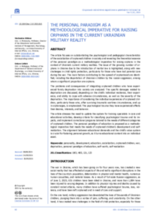The article focuses on substantiating the psychological and pedagogical characteristics of the socialization of orphaned children in society and revealing the theoretical essence of the personal paradigm as a methodological imperative for raising orphans in the context of Ukraine's current military realities. The issue of the growing number of orphans in Ukraine due to the introduction of martial law is highlighted, along with new challenges in child rights protection, particularly for those who have lost parental care during the war. The main factors contributing to the spread of orphanhood are identified, including the deportation of Ukrainian children by the russian aggressor, among whom a significant proportion are orphans.The problems and consequences of integrating orphaned children who have experienced family deprivation into society are analyzed. The specific damages related to deprivation are discussed, depending on the child’s individual resilience, their experience, and ability to cope with adverse circumstances, as well as the severity of the deprivation. The importance of considering the individual experiences of orphaned children, particularly those who, after surviving traumatic wartime circumstances, end up in orphanages, is emphasized. The psychological trauma they have experienced affects their desires, interests, and behavior.The article stresses the need to update the system for training specialists in care and educational activities, develop criteria for classifying psychological trauma and its impacts, and implement correctional programs tailored to the needs of different categories of orphaned children. The personal paradigm of education is proposed as a methodological imperative that meets the needs of orphaned children’s development and self-realization. The alignment between educational demands and the child's value system is crucial for fostering personal growth, as it turns educational content into an individual asset.

